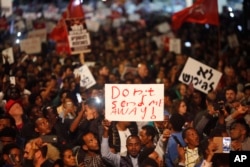About 15,000 protesters turned out Saturday on the streets of Tel Aviv to voice their opposition to the deportation of African asylum-seekers, many of them from Sudan and Eritrea.
The demonstration in south Tel Aviv was in the heart of the area where many Africans live after arriving in the city via the bus station there. Over the past 12 years, about 40,000 Africans are estimated to have entered Israel illegally.
Earlier this week, Israel began detaining African asylum-seekers who refuse to accept the deal Israel offers to encourage them to leave — $3,500 and a plane ticket to an African destination. Refusal to go could land them in jail indefinitely.
About a dozen such refugees were jailed this week.
The Israeli government considers these people economic migrants who have come to Israel to seek jobs rather than avoid persecution. But Saturday’s protesters — sympathetic Israelis, as well as asylum-seekers themselves — carried signs saying “No to deportation” and “We’re all humans.”
Earlier this week, some African migrants wrapped themselves in chains to protest, chanting, “We are refugees, we are not criminals!”
Most of the migrants say they prefer prison in Israel to returning to Africa, where their lives will be in danger.
The crackdown has been condemned by Israeli human rights groups, which say that since Israel was built by refugees from the Holocaust, it has a moral obligation to help those facing a similar fate.






